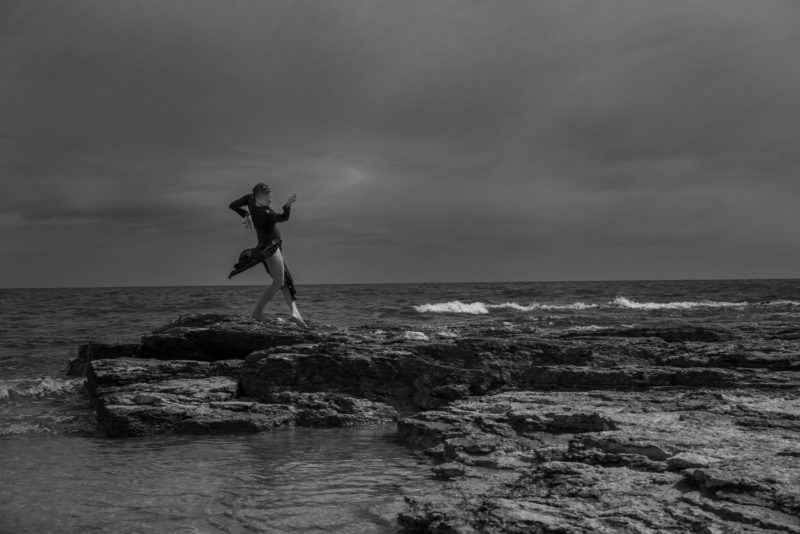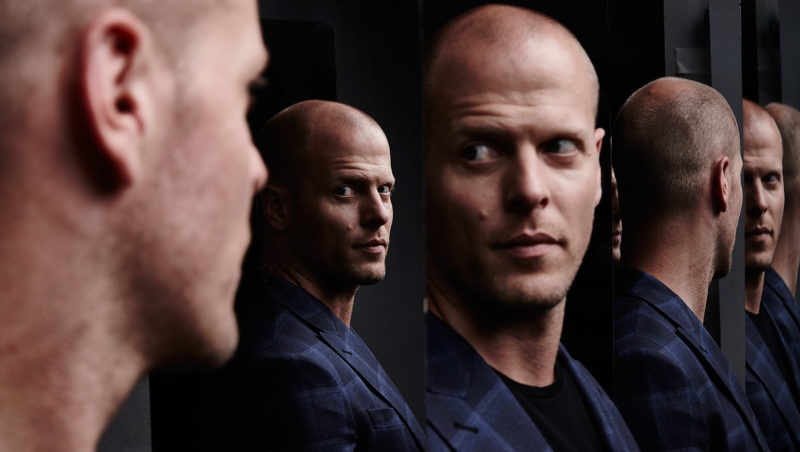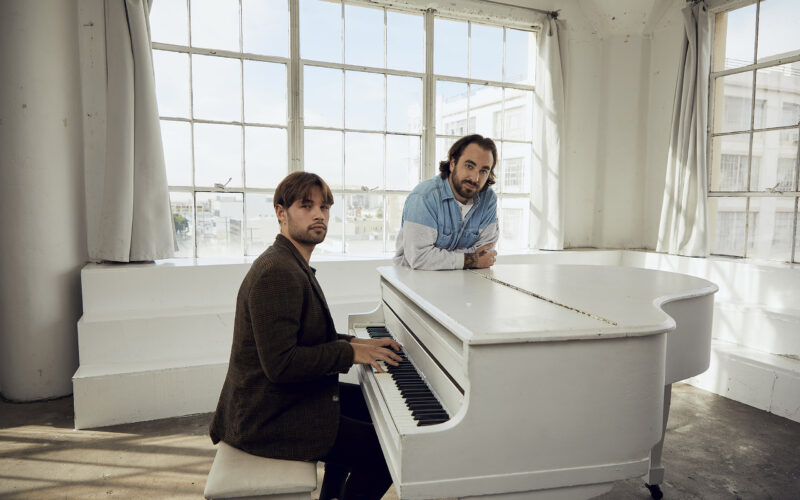There is no force on this earth more powerful and more constant than water: Massive, slow-moving glaciers help carve the surface of the earth, shaping mountains and valleys. Water expands and contracts with the seasons, freezing and thawing. Over time, this range of force can split an ancient boulder into pieces just as easily as the gentle flow of a river can create a peaceful, dreamy lull. It is this versatility of water and its constant momentum that has long been a source of fascination for musicians and artists.
Helene Grimaud, world-renowned concert pianist has no shortage of momentum, and has been making waves throughout her career. It comes as no surprise that for her new album, the artist has chosen water to be the title and theme.
Grimaud cites nature as being the best inspiration. As a child, she had aspired to become a field biologist, though her mother believed that the child’s capacity for argumentation would better enable her to be a lawyer.
Her artistic drive soon found her making waves in a different way: through the music.
In her performances, impassioned artistry resounds from her piano, which the artist plays as if it were an extension of herself.
“Water” is comprised of the music of 9 composers who share in Grimaud’s romantic fascination with water, including Debussy, Liszt, and Ravel. Producer Nitin Sawhney’s creates transitions that weave the space and time between the pieces together in an ongoing flow.
Beyond the romance, the album is also laced with Helene’s deep sense of social responsibility in seeking to raise awareness of the state of water in the modern world.
Hėlène will be playing several upcoming dates in the US: Philadelphia Orchestra / March 3, 4, and 5 with Conductor Leonard Slatkin.
ALEX & IGGY: Considering all your accomplishments, how do you plan for the future?
HÉLÈNE GRIMAUD: I don’t. The only thing I’m interested in is growth as an artist and as a person. It’s better like this because I have a one-track mind; if I could see where I want to be, I would probably take the straightest path and miss some nice experiments and adventure along the way.
A&I: Your current album is about water; where do you seek inspiration?
HG: In everything you feel in relationships, encounters, moods, emotions. All of these feed art—but the best inspiration is nature.
A&I: What’s your favorite place?
HG: I love being in the woods. Maybe if it’s from my early years when I read about romantic composers who would take walks in the woods and said, “It was as if the composition was whispered by the wind through the leaves of the trees….” And they would just come back and put it on paper and it was all there.
A&I: Speaking of woods and your love of nature, do you like camping?
HG: No, just walking. Silence is one of the hardest things to find. But I probably would if I wasn’t on the road so much.
A&I: What era of history would you like to visit?
HG: I would have to go with the beginning of the German Romantic Movement, when Novalis lived. [Novalis is the pen name of the 18th-century German poet, metallurgist and aphorist Georg Philipp Friederich Freiherr von Hardenberg.]
A&I: Which moments would you revisit from your own life?
HG: Actually, I’m happy where I’m at. Some encounters are huge, pivotal moments when you feel that before-and-after; that’s something you would always like to relive. It takes a long time to get to what you imagined but also to the best of what you have to offer in terms of potential. There are many bumps along the road until you stop fooling yourself about who you are.
A&I: You once stated that if you had to do something other than music, you’d have been an environmental lawyer.
HG: You can’t believe everything you read! I always had a capacity for argumentation. I think as a kid I already was a real pain for the family: My mom said “You would make a great lawyer” because I was always countering and discussing everything until the end of the day. But I would have been a field biologist because that’s what I always loved.
A&I: Any fears?
HG: The feeling of letting people or yourself down, of not doing what you are capable of doing. That’s never pleasant but it goes with the territory. It’s a road with ups and downs. As long as the general direction is upwards, that’s what you hope for.
The moments when you learn and develop most are after something which didn’t work out as you were hoping. When everything is going well, you’re not developing much. If you take risks, some are bound to not fly. This is something you learn early on, You learn to accept it; as unpleasant as it can be to live with, it’s part of the deal. If you can’t take it, you shouldn’t be in the profession.
A&I: What’s the biggest risk you’ve taken?
HG: It sounds cliché, but no matter how great the ten previous concerts, every time you walk onstage it all happens in that moment. There are experimental projects where you don’t know if people are going to think, “Has she lost it completely?,” but that’s something else; when you work out of artistic conviction, what people think isn’t part of the equation. But when you walk onstage you know you have everything to lose every time.
If you do it in the comfort of your command center, you miss out on what live music is about: the attempt to make time stop. The transmission of emotion. You have to have the wisdom to relinquish control. Otherwise you’re missing the point.
A&I: You were once considered somewhat rebellious. Have you mellowed?
HG: I wouldn’t like to think so! Let’s say I’m more intent on finding harmony. I used to thrive on conflict and never accepting things for what they were. Or when somebody would tell me something, I wanted to know “Why?” and “Why not otherwise?”
As you mature you do want you want, but don’t need to announce or make a case out of it every time. You simply follow your path. You also don’t have to justify yourself, which is one advantage of having been at it for thirty years. You have more energy to devote to the subject matter.
A&I: Are you interested in conducting?
HG: I love to work with smaller groups and chamber orchestras, and doing it without a conductor is a wonderful thing, but it’s not just about gesticulating in front of the group while onstage. It’s more about the work you do together during rehearsals.
I just came out of two such projects. It’s wonderful because you have double or triple the normal rehearsal time. I love that process of work. A chamber orchestra with a strong leader doesn’t need someone from the piano “showing” them, because it’s really chamber music on a larger scale. But standing in front of a symphonic orchestra? That’s not for me. I’m into making music happen with a tool.
A&I: Any secrets to your youthful looks? You look exactly like you do from decades-old pictures!
HG: I should probably do more in terms of fitness or taking care of myself! Maybe loving what I do keeps me vital.
A&I: Do you practice every day?
HG: Yes, two to six hours depending on what’s going on.
A&I: Is it true that you rehearse mentally, without a piano?
HG: I discovered that early on, in a no-choice situation. I read a book about mental practice. Pianists don’t always have access to an instrument; maybe you have an hour and a half, which isn’t like doing it for six hours in a row where you switch into autopilot mode. In a crunch it’s fine, but it’s not really the way I like to practice. I take frequent breaks, but when I go back, I always try to keep it short.
A&I: What’s your favorite city to play?
HG: I love L.A., Amsterdam, Cologne. Those ten concerts at the Armory [in New York] were a special experience. If you have a beautiful hall with wonderful acoustics, you immediately love everything about the town. It’s irrational; even if you have never done anything other than go from the airport to the hall, you have this rosy vision of that place because of the concert experience of that building. I hate halls where the sound is dry as a doornail and just falls like dust. You need that resonance, that physical quality that surrounds and goes through you.
A&I: Did you ever consider another instrument?
HG: When I was a child I loved having the cello resting on me, and feeling those vibrations. No wonder cellists are able to play much later in life than other instrumentalists; it keeps you healthy. And I love that warm sound, so close to the human voice. But my instrument is the piano because of that harmonic foundation. As beautiful as it is to focus on one phrase, let that phrase soar and just be into the horizontality of music, I would miss the vertical dimension of the piano.
A&I: There seems to be a lack of diversity in female classical pianists.
HG: There are some spectacular woman talents and that’s really cool because it wasn’t that way for a long time. You have Yuja Wang, a fantastic pianist and musician; Khatia Buniatishvili from Georgia is also quite wonderful. And Anna Vinnitskaya, a Russian pianist. They’re all in their late twenties or early thirties and are absolutely amazing. Female power! Good to see.






